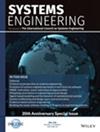关于参考架构
IF 1.6
3区 工程技术
Q4 ENGINEERING, INDUSTRIAL
引用次数: 0
摘要
参考架构是系统工程师的关键架构资产,既能简化其工作,又能保证其系统分析覆盖面的详尽性。本文以抽象解释理论为基础,提出了参考架构的正式定义,将抽象概念正式化,分别涵盖大型和小型系统系列。这些定义通过汽车、建筑和采矿案例研究加以说明。本文章由计算机程序翻译,如有差异,请以英文原文为准。
On reference architectures
A reference architecture is a key architectural asset for the systems engineer, that intends both to simplify its work and to guarantee the exhaustiveness of the coverage of its system analyses. This paper proposes formal definitions for a reference architecture, based on the theory of abstract interpretation that formalizes the notion of abstraction, which covers respectively large and small‐scale families of systems. These definitions are illustrated by automotive, building, and mining case studies.
求助全文
通过发布文献求助,成功后即可免费获取论文全文。
去求助
来源期刊

Systems Engineering
工程技术-工程:工业
CiteScore
5.10
自引率
20.00%
发文量
0
审稿时长
6 months
期刊介绍:
Systems Engineering is a discipline whose responsibility it is to create and operate technologically enabled systems that satisfy stakeholder needs throughout their life cycle. Systems engineers reduce ambiguity by clearly defining stakeholder needs and customer requirements, they focus creativity by developing a system’s architecture and design and they manage the system’s complexity over time. Considerations taken into account by systems engineers include, among others, quality, cost and schedule, risk and opportunity under uncertainty, manufacturing and realization, performance and safety during operations, training and support, as well as disposal and recycling at the end of life. The journal welcomes original submissions in the field of Systems Engineering as defined above, but also encourages contributions that take an even broader perspective including the design and operation of systems-of-systems, the application of Systems Engineering to enterprises and complex socio-technical systems, the identification, selection and development of systems engineers as well as the evolution of systems and systems-of-systems over their entire lifecycle.
Systems Engineering integrates all the disciplines and specialty groups into a coordinated team effort forming a structured development process that proceeds from concept to realization to operation. Increasingly important topics in Systems Engineering include the role of executable languages and models of systems, the concurrent use of physical and virtual prototyping, as well as the deployment of agile processes. Systems Engineering considers both the business and the technical needs of all stakeholders with the goal of providing a quality product that meets the user needs. Systems Engineering may be applied not only to products and services in the private sector but also to public infrastructures and socio-technical systems whose precise boundaries are often challenging to define.
 求助内容:
求助内容: 应助结果提醒方式:
应助结果提醒方式:


